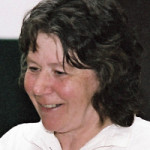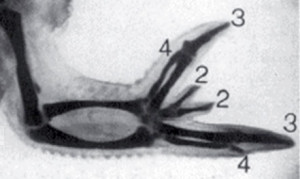Background & History
The BSDB have taken the decision to award a new annual medal, the Cheryll Tickle Medal, which will be awarded to a mid-career, female scientist for her outstanding achievements in the field of Developmental Biology. The first medal will be awarded at the 2016 BSDB Spring Meeting, where the recipient will present the Cheryll Tickle Award Lecture. BSDB members are invited to nominate suitable candidates.
 The award is named after Cheryll Tickle (CBE FRS FRSE Hon FSB), an extremely eminent cell and developmental biologist who used the developing limb bud to explore pattern formation in embryogenesis. After her undergraduate studies at
The award is named after Cheryll Tickle (CBE FRS FRSE Hon FSB), an extremely eminent cell and developmental biologist who used the developing limb bud to explore pattern formation in embryogenesis. After her undergraduate studies at  Cambridge and PhD work at Glasgow, she worked as a postdoctoral researcher at Yale University, then as a postdoc in the group of Lewis Wolpert at Middlesex Hospital (later merged into UCL) where she studied the morphogen model of digit patterning. This laid the foundation for her subsequent work on the elusive limb polarising factor, mechanisms of limb outgrowth, FGF signalling, HOX gene regulation and snake limblessness. While at Middlesex/UCL, she moved up the ranks from lecturer, to reader and eventually to Professor, and shortly after she was elected a Fellow of the Royal Society, an acolade which was awarded the
Cambridge and PhD work at Glasgow, she worked as a postdoctoral researcher at Yale University, then as a postdoc in the group of Lewis Wolpert at Middlesex Hospital (later merged into UCL) where she studied the morphogen model of digit patterning. This laid the foundation for her subsequent work on the elusive limb polarising factor, mechanisms of limb outgrowth, FGF signalling, HOX gene regulation and snake limblessness. While at Middlesex/UCL, she moved up the ranks from lecturer, to reader and eventually to Professor, and shortly after she was elected a Fellow of the Royal Society, an acolade which was awarded the  same year she moved to Dundee (1998). Cheryll was the first ever Waddington medal winner (1998) and became the first female Royal Society Foulerton Fellow (2000). Currently Professor Emeritus at the University of Bath, she continues to explore diverse limb projects such as the loss of the pelvic fin in natural populations of sticklebacks as well as ectopic bone formation in wounded war veterans.
same year she moved to Dundee (1998). Cheryll was the first ever Waddington medal winner (1998) and became the first female Royal Society Foulerton Fellow (2000). Currently Professor Emeritus at the University of Bath, she continues to explore diverse limb projects such as the loss of the pelvic fin in natural populations of sticklebacks as well as ectopic bone formation in wounded war veterans.
Nominations for the Cheryll Tickle Medal
Nominees should be outstanding female developmental biologists who have started their own research group in the UK within the last 15 years, with allowances for career breaks. Nominees should have made significant contributions to UK Developmental Biology and stand out as a role model for early career female researchers.
The following nomination procedure has been agreed by the Committee:
- Formal nominations should be made to the BSDB Secretary (secretary@bsdb.org) by the closing deadline which is 1st of July each year, but can be received at any time.
- Nominations should be submitted as a statement of support (maximum 1 page A4) from a Proposer and Seconder (both BSDB members), explaining why the candidate is suitable for the Medal and providing a short summary of their major contributions to Developmental Biology.
- Nominations must be accompanied by a CV of max. 2 pages.
- All nominations received will be considered, and voted upon, by the Committee.
The winner will be invited to present the Cheryll Tickle Award Lecture at the following BSDB Spring Meeting, where the medal will be presented, usually by the BSDB Chair.




